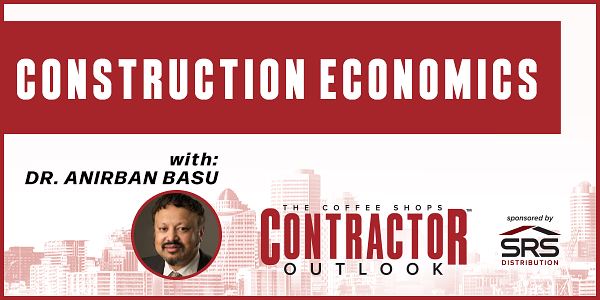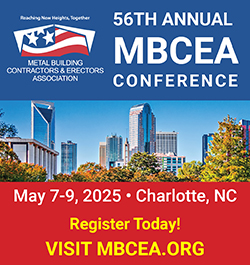UP TO THE MINUTE
Construction Economics - PODCAST TRANSCRIPT
November 28, 2024 at 6:00 p.m.Editor's note: The following is the transcript of a live interview with Dr. Anirban Basu, chairman & CEO of Sage Policy Group. You can read the interview below, listen to the podcast or watch the recording.
Intro: Hello and welcome to Contractor Outlook Newscast. My name is Heidi Ellsworth and we're bringing this to you from the Coffee Shops. This is a chance for contractors to hear from experts that are a little bit outside the construction industry, but have great insights on how it can help your business in the coming months. In the past, we've talked politics, we've talked weather, but today we're talking economics. I have to tell you, I've listened to our guests speak before, engaging, informative, a lot of wisdom, so I know you're going to enjoy it very much. And so I am very happy to introduce Dr. Basu, the chairman and CEO of Sage Policy Group. Hello, how are you today?
Dr. Anirban Basu: I'm doing just fine. Happy to be here with you to talk about the economics of the US construction industry.
Heidi J. Ellsworth: Yeah, we have a lot to talk about, but let's start with an introduction. If you could introduce yourself and tell us a little bit about your company overall.
Dr. Anirban Basu: Yeah, my full name is Anirban Basu. I'm an economist from Baltimore Maryland. Our company's name is Sage Policy Group, Incorporated. And part of what our company does is we serve the chief economist function for many organizations, including associate bills and contractors, the Construction Financial Management Association, the Modular Building Institute and many others. And so I'm outside of construction, you won't see me with a hammer. I don't have any welding equipment. You won't find me on a roof probably unless something very bad is happening. But I study a lot of construction economics and so I follow the data, and so happy to be a part of this conversation.
Heidi J. Ellsworth: Yeah, I think it's so important now as we go into 2025, especially with the election's over, change in administration, there's just so much. But let's talk upfront about the trends that you're currently seeing in construction and really what contractors should be thinking about financially as we look into the new year, 2025.
Dr. Anirban Basu: Well, it depends on who you are really, which segments are you attached to, because there are certain segments of construction that are going to continue to generate lots of opportunity for contractors. Some of the most obvious categories are data centers, of course, manufacturing facilities, public works, roads, bridges, water systems and perhaps healthcare as well. And so for contractors who are engaged in public work, have lots of backlog, are specializing in data center construction, whether exterior shells or whatever it happens to be. Lots of HVAC contractors, of course, are involved in the data center construction boom in America. And of course artificial intelligence signifies that that boom will continue for many years to come. So for those contractors, what's the issue for the most part? Keeping good workers. Finding good workers. The issue has not been deal flow, it's been finding the workers to do the work.
Now you've got another group of contractors in a very different circumstance, largely those contractors that focus on residential or commercial building. So we've seen construction slowdown in the US, multifamily segment, meaning if your apartment buildings are under construction, we've seen some slowdown in distribution center, fulfillment center construction and we've seen some slowdown obviously in the traditional office market for obvious reasons, the pervasiveness of remote work. And so for those contractors, what I've heard is backlog is beginning to shrink a little bit. They're worried about 2025 a little bit, they're working through their backlog too quickly. And so it is often said where you stand depends upon where you sit. And if you're sitting there building data centers, you've got no issues pretty much. But if you're sitting there and you work on retrofitting office space, well, the outlook may not be quite as good.
Heidi J. Ellsworth: And talk just a little bit more on the residential and even, let's go into the exteriors. When we're talking about roofing, metal siding, building envelopes, it seems like the difference between new construction and restoration basically or remodel. How do you see that with, especially looking at some of these office spaces, the things that are happening, there's a lot of people having to try to restore them and repurpose them. What are you seeing there?
Dr. Anirban Basu: Well, we had that remodeling boom, of course during the pandemic and initial stages of recovery they're from, people working from home, they wanted to create home offices, they wanted to create home gyms. They wanted to create some extra space because they're spending more time at home.
Heidi J. Ellsworth: Right.
Dr. Anirban Basu: All of a sudden, their home was their office building, but it was also their recreational center. It was all kinds of things. And mortgage rates were low and home prices were rising very rapidly. And so what you get, you get a lot of cash out refinancing. Lots of money is available for upgrades to HVAC systems, to basements, whatever it happens to be. Fabulous period for residential contractors. But then what happens, starting in roughly early 2022, interest rates took off, mortgage rates started to rise. People had to engage in those home improvements so they need to do that again, necessarily, right? You upgrade a kitchen, you're not going to do it necessarily anytime soon or at least not for a few years. And so all of a sudden that remodeling segment was not as strong and cash out refinancing is more difficult when mortgage rates are still so high.
And by the way, I think this surprised a lot of contractors and other economic observers. Mortgage rates actually recently, as we're talking, have been rising. There's a lot causing that. But one of them is that the perception is the US economy is going to continue to grow. It's going to be inflationary. Obviously we have now the presidential election's behind us, but what we don't have behind us is an awareness of what the policymaking is going to look like. What are tariffs going to look like? What are tax cuts going to look like? How inflationary is that? What is going to be the immigration policy? Many residential contractors, roofing contractors, others, drywall contractors, they use a lot of foreign-born talent. I'm not going to say whether or not that talent is documented or undocumented, I don't know. But they use a lot of foreign-born talent so any shifts in immigration policy can dramatically decrease human capital supply, raise labor costs, a lot facing the contractor community as we head towards 2025.
Heidi J. Ellsworth: Yeah, so much of that. There's so much in that, what you just said. So let's break that down and let's talk about tariffs because I want to get to interest rates too, but let's talk about tariffs on all the imports. There's a lot of discussion during the election about raising tariffs and that throughout for the economy, what do you think and what are your thoughts on what the possibilities of tariffs and how that's going to influence the construction industry?
Dr. Anirban Basu: Again, I'm an economist, so I have been trained in what? To love free trade and fair trade as a general proposition, when you find economists, we don't like barriers to trade. We think that free trade, generally speaking is pretty good that you get-
Heidi J. Ellsworth: I feel the same.
Dr. Anirban Basu: ... specialization from production. So I'll give you an example. So if we, Americans and this is actually a bad example, are good at producing airplanes, let's say we were.
Heidi J. Ellsworth: Yeah.
Dr. Anirban Basu: We specialize with that and the rest of the world benefits from our economies of scale, the fact that we're really good at producing aircraft and because we're producing so many, we're able to produce each incremental unit more cheaply and more expertly and the world benefits from that. Let's say the Brazilians are better at producing beef or the Spanish are producing wine, well, they produce wine and they do at scale. So we get great bottles of wine from Spain or France at very low cost. And this is the notion of free trade and hopefully fair trade as well. Tariffs, of course, raise the price of those things. They lead to less specialization as it turns out. And so as it turns out, that tends to be inflationary. It tends to shrink the global economy relative to what it otherwise would be. And so of course, tariffs have been proposed on Chinese goods, 60% by the incoming Trump administration.
China's home to a quarter of global manufacturing and is responsible for about 18% of US goods imports. So, and of course many contractors depend upon equipment and materials coming from China, whether it's drywall or decking material, whatever it happens to be. And of course, any tariff would drive up their costs. And so what I hear from a lot of people who are very happy about the election results is this. They say, "Look, don't take Donald Trump literally just take him seriously." So we know he wants to push the economy in a certain direction. He wants more domestic production here. He wants basically foreigners to pay more of our tax bill as it turns out, that's what tariff is. It's a tax on people trying to export to this country and of course a lot of people like that. But as a general proposition, it would tend to drive up costs. It tends to shrink international trade flows. And from my training, my background suggests overall that's not great for the economy, especially if those tariffs are not properly targeted.
Heidi J. Ellsworth: Right. And I worry about the overall for construction because we work with so many different manufacturers that a lot of it is made in the USA. But to your point, there are other scales and opportunities that we have a number of products that are coming from China that you wouldn't even know they're coming from China. And so now these manufacturers are going to be raising their prices if this happens. So I do think it's going to have an effect across, starting with our manufacturers all the way down to the contractors within the industry as depending on what truly happens. There's always a lot of talk around elections, so waiting to see what actually happens will be interesting.
Dr. Anirban Basu: Exactly. A lot of talk. And yes, we have an incoming president of course, but we have a Senate and we have a House of Representatives, Washington DC is messy, as is democracy, so there's lots of uncertainty here. And by the way, that affects contractors too, just the fact of the uncertainty because a lot of project owners are saying right now, "Look, I don't know what the tax codes will look like. I don't know if I'm going to get bonus depreciation. I don't know much of anything. I'm going to wait and see." And wait and see, generally speaking is bad for economic activity, right? Because economic activity is not going to occur until people wait and see.
Heidi J. Ellsworth: Wait and see.
Dr. Anirban Basu: And you had mentioned that we'd talk about interest rates separately, but of course we can't in some sense because if we agree that tariffs are inflationary, keep prices higher than they otherwise would be, well, higher prices and more inflation are associated with higher interest rates. And one of the things that we've observed from the bond market recently is that actually the interest rates at which we contract, project financing interest rates, meaning a developer is trying to line up financing, their cost of capital is going up, not down. I know that surprised some people because the Federal Reserve has actually been cutting rates since September 18th of this year.
Heidi J. Ellsworth: Right.
Dr. Anirban Basu: But as a practical matter, the interest rates at which you and I transact have been rising, including things like mortgage rates, which renders cash out refinancing that much more problematic. So there's lots to be concerned about in 2025, at least if you're involved in certain segments of the US construction industry.
Heidi J. Ellsworth: So to that point, what areas do you see are going to probably be and I know you said this at the very beginning, data centers, but as contractors are looking at diversifying their business, what are some of the markets that they should be looking at that may be more stable next year?
Dr. Anirban Basu: Let me give you an example of something that's about to happen. Adaptive reuse massively, right? Because a lot of these older office buildings have to be repurposed. Not all of them can be. We hear from architects all the time that not every office building can be converted into an apartment building or anything else as it turns out. So they're going to stay office buildings, but there are going to be a number of opportunities in every market in which some number of properties can be converted. We have a lot of malls, '80s vintage, '90s vintage malls that are running out of their useful life. They're going to falter soon. They said that one in four roughly US shopping malls or shopping centers will falter in the next few years. And so often these malls are surrounded by acres of surface parking, all kinds of opportunities for mixed use development, data centers, you name it, outpatient medical facilities.
Heidi J. Ellsworth: Yeah.
Dr. Anirban Basu: And so, one of the things I've been telling contractors is focus on that, if you can. Adaptive use, make that part of your marketing that if you want to transform a property, really transform it, call us.
Heidi J. Ellsworth: Yeah. I like that.
Dr. Anirban Basu: We'll help you turn that money loser into a money winner, into a money maker. And so that's one thing I suspect will be very stable in the sense that we have so much property that we need to adaptively reuse that that's going to be a source of business for years. And I mentioned of course data centers, that's a no-brainer obviously, as our manufacturing facilities, as re-shoring occurs, as more supply chain comes back to America, I again mentioned healthcare. America is getting older, healthcare utilization is up. The pandemic laid bare the fact that many major medical systems do not have enough inpatient or outpatient delivery capacity. Again, infrastructure is a major source of work. And so there are segments that one would expect to grow along with the broader economy.
But of course, behavioral changes have rendered other segments much weaker. I will say that one other segment I didn't mention, the hotel construction sector has been quite weak in recent years, but it's picked up over the last year. Leisure travel's come back with a vengeance, hotel occupancy is up in much of the country. And one of the things to note is that in our country, for better or for worse, the rich guy a lot richer. Their homes became more valuable, their financial portfolio is thicker. The S&P recently touched 6,000. The Dow Jones recently touched 44,000. Bitcoin just hit 90,000 as I'm talking to you.
Heidi J. Ellsworth: Wow.
Dr. Anirban Basu: And so people with assets have become much wealthier. And what do they like to do? They love vacations. They love luxury properties. So one of the things I think you'll see is a lot of construction of luxury properties, and that could include things like condominiums, but also luxury hotels.
Heidi J. Ellsworth: That is so interesting. What are some of the bottlenecks that you see in supply chain? We went through all that right after COVID, that was all everybody talked about, material shortages, everything like that. Do you see any bottlenecks that way along with labor going into 2025 for the construction industry?
Dr. Anirban Basu: There're always going to be supply chain issues, right? So what have we seen in the last couple of years? We've seen Houthi rebels and Somali pirates in the Red Sea limiting the use of the Suez Canal, driving up shipping insurance costs. We've seen low water levels in the Panama Canal, a bridge collapse in my town of Baltimore. We've seen a lockout of railroad workers at two Canadian railroads. We've seen the Chinese Coast Guard very active in hostile ways in the South China Sea, we've seen all those kinds of things. So there's still supply chain issues out there. But one of the things that's happening out there is I hear a lot of hoarding of certain types of equipment, HVAC in particular.
Heidi J. Ellsworth: Really?
Dr. Anirban Basu: Because these data center developers need so much equipment and they're willing to pay so much for it because there's so much money at stake that they're stockpiling all kinds of HVAC equipment, for instance... And that makes it more difficult for people who are operating in other segments of the economy to gain access to that kind of equipment. And I'm hearing that kind of story more and more so it is not necessarily a supply chain issue. What it really is there's a segment of the economy that's booming, artificial intelligence/data centers and they're soaking up a lot of productive capacity. We saw things earlier when Amazon was developing so many fulfillment centers. They were consuming a lot of the steel that is used for construction in this country, same kind of thing, drives up the price for everyone else, makes steel less available for everyone else.
I would say the same thing with data centers now. So there are some bottlenecks out there in the supply chain. I would generally say that the supply chain is much more efficient than it was in late 2021 when materials prices were surging. You might remember late 2020 and 2021, you remember the cost of delivering construction services was just booming higher. And a lot of contractors took losses during that period because they did not build that escalation into their project bids. That's also when they called their attorneys and asked the question, "Hey, do we have a force majeure clause in this contract? Because we're taking a beating. We did not build these input costs into our bids." That really has settled down in the last couple of years.
Heidi J. Ellsworth: So, and I know this is a crystal ball question, but I'm interested, we already touched on it, we touched on interest rates and what that's meaning to everyone, but what do you see with the Fed as you're looking at going into 2025? Do you think they're going to continue to drop interest rates to, like you said, to help with the tariffs or different things? What's the feel there on where interest rates are going and are we as normal people ever going to see some of the positive from that?
Dr. Anirban Basu: Right. So let's do some review here. Between March 17th of 2022 and July 26th of 2023, the Federal Reserve took the upper limit of the federal funds rate, one of the rates it controls directly, from 0.25% to 5.5%. If you're counting at home, that's 525 basis points of rate increases. Now, that's 5.25 percentage points. That's a game changer obviously for project financing, for instance.
Heidi J. Ellsworth: Right
Dr. Anirban Basu: Now, on September 18th of 2024, they started to reduce rates. People might remember that they cut that interest rate by half a percentage point, and then on November 7th, two days after election, they cut that rate by another 0.25 percentage points. Now, as we're talking here, we don't know what they're going to do in December, but my presumption still is that the Federal Reserve will cut that interest rate by another 0.25 percentage points in December. So what does that mean? That that upper limit on the federal funds rate has gone from 5.5%, by the end of this year if I'm right about December down to 4.5%. Here's the thing, it's still quite high. It's still restrictive. It's not especially accommodative from the perspective of monetary policymaking. And there has been this expectation before, two things happened recently that the Federal Reserve would cut rates significantly in 2025, maybe by as much as 1.5 percentage points.
What are those two things that have happened that have interfered with that outlook? Number one, the inflation data have been coming in a bit hotter than anticipated. So you look at the measures like the PCE deflator, the personal consumption expenditures deflator or core PCE deflator, that's showing a bit more inflation than many people expected. And the same is true for the consumer price index and the producer price index measures. That's one thing. And of course, the Federal Reserve has this 2% inflation mandate, they want inflation to get down to 2%. We're not quite there yet. The other thing, of course, is Donald Trump got elected on November 5th. And while many people like the idea of his policymaking, it's pro growth, it's pro business, it's pro commerce, I understand all of that, but it also is pro inflation. It's inflationary, arguably.
Between tariffs and tax cuts and so on and so forth, and renewed or changed or altered immigration policy, generally speaking, would tend to drive up costs and therefore prices. And so you put all that together and now many economists thinks that the Federal Reserve, instead of cutting rates six times next year, will do it only twice next year. And it wouldn't be hard to find an economist who expects zero rate cuts next year. So interest rates are set to stay higher for longer and I would say as a general proposition, contractors don't like that. Now, this is pure conjecture, what if Donald Trump does not try to implement these proposed tariffs? What if we don't get a major tax cut? What if immigration policy doesn't change so much? We don't know what we don't know. But then of course, we go back to the ex-ante expectation of the Federal Reserve cuts rates many times next year. But again, right now as of this conversation, not clear.
Heidi J. Ellsworth: Yeah. And you're mentioning tax cuts. So one of the things in the roofing industry, when we go to Roofing Day, we have been lobbying for main street taxes for the pass through, that we keep that because that's going to sunset in 2026 or 2025, one of those two dates. And with this change in administration, what do you see around tax cuts? I know it's again, a crystal ball, but what do you see around tax cuts? Because it seems like there's a lot of people, especially in construction who are escorps or LLCs who have pass throughs and also other individuals who are wondering about their taxes. What are you seeing in there for next year?
Dr. Anirban Basu: So again, wild card, right? Because look, I think a lot of subchapter S corporation owners and LLC owners love the idea of cutting income tax rates. I myself am a subchapter S corporation owner, so I would not mind, selfishly, a bit of a tax cut. By the way, all kinds of talk, at least on the East coast of the United States, about what's going to happen with those SALT deductions and will that cap be lifted from 10,000? I'm from Maryland, we're a high tax state and so if I don't get deducted those taxes aggressively, that raises my overall tax bill. Anyway, the point is a lot of lack of clarity. I think one of the issues here is this: Donald Trump would love, I think, based on what he has said, to implement more tax cuts and of course to extend many of the provisions under the Tax Cuts and Jobs Act, which he signed in late 2017. I think what you're going to hear actually from a number of people in Congress, whether the Senate or the House, but both probably is talk about the national debt.
Which is now $36 trillion and an annual budget deficit that just reached $1.8 trillion. It's not sustainable, everyone knows it. And some people might be surprised that the Congress might push back on the President-elect's proposals a bit on the grounds of raising the deficit and raising the national debt, that they want to push back on that. That they do not want the deficit to continue to rise, they do not want the national debt to rise so quickly. So we shall see. And that would suggest that maybe we don't get quite the level of tax cutting that many people are anticipating. And actually, that would be not great for an economic growth perspective, but it would be good from the perspective of inflation and trying to promote lower interest rates. Because if you're shoving less money into the economy, that tends to reduce the pressure on prices, which obviously reduces the pressure on the Federal Reserve to maintain tight monetary policy in the form of high interest rates. So all these things are related.
Heidi J. Ellsworth: Yeah. Wow. So interesting. So when you're looking at the different subsets, and you've already said this a little bit between HVAC, roofing, general contractors, metal, I will say in the roofing industry, we're always like, "Everyone always needs a roof and there's a lot of severe weather", which really affects, I think, overall that market. But what are you seeing with the different segments of the trades and if there's any areas to be watchful?
Dr. Anirban Basu: Well, look, again, we talk about immigration policy. In many communities, a majority of the people who are actually standing on our roofs are foreign-born. And again, I can't tell as I'm looking at them work, whether they're documented or undocumented, I can't tell that, but they're foreign born. And so immigration policy really matters, I think in terms of creating, again, that labor force for contractors that are painting contractors, drywall contractors, roofers, that's where we see a lot of foreign talent engaged and so obviously that's one issue. Tariffs or another issue, what's going to happen to the price of inputs, whether it's paint or whatever it happens to be? Very good question, unknown at this time. What's going to happen with interest rates and project financing? Because a lot of people want to improve their homes.
Let's take roofs, everyone needs a roof. There has been a lot of bad weather. There'll continue to be, I presume. But there's also a cosmetic aspect to fixing a roof. It makes the house more beautiful. That's a lot of square footage in your part of a house, isn't it? And so it really shapes, it frames the curb appeal of the house. But if people are having a tougher time, cash out refinancing to finance that kind of bulky improvement. And if consumers are pessimistic because they're being waylaid by still high prices, there's a reason the election worked out the way it did. Now, there are many issues there, right? People talk about reproductive rights and all these kinds of things, and they can talk about all kinds of other issues, education, but the number one issue was the economy by far.
And what was the number one economic issue? Inflation. A lot of Americans are tired of paying high prices. What I'm suggesting to you is that because they've been paying high prices for so long, they don't necessarily have the financial capacity to fund improvements the way they once did. And with interest rates high, they don't necessarily want to borrow. And so a lot of those discretionary projects were, yeah, I don't need to do the roof, but I want to because it looks shabby. A lot of people might postpone that kind of work. And that's one of the reasons of course, the contractors generally speaking, want interest rates to fall faster. But now the outlook for them falling faster is in question, very much in doubt, at least in 2025.
Heidi J. Ellsworth: Lot of questions out there, a lot of wild cards. I like how you said that. So with all of that in mind and everything we just talked about, a nugget, a piece of advice that you would give to contractors out there overall and what to watch for, what to be doing, what to be in their planning as we move into 2025.
Dr. Anirban Basu: A couple of things, I would say for those that are in rapidly expanding markets, again, we mentioned some of them, data centers, industrial facilities, hold onto your talent. Don't be penny-wise and pound-foolish. Hold onto that talent because...
Heidi J. Ellsworth: That's a good point.
Dr. Anirban Basu: Because these hyperscalers, if we're talking about data centers or these manufacturers or computer chips or EV batteries, whatever they are supposed to be, they want to get this capacity up and running. They're willing to pay more for that, the speed, the expediency. And so yes, workers are going to cost more, but it's going to be easier to pass along some of those cost increases in the form of higher bid. And that would tend to increase, not just backlog, but actually profit margin potentially as well. So that's one. Second, talk to your banker because for those contractors and segments that are not going to do particularly well in 2025 and by the way, I've already been speaking to some contractors and this has been happening for the last year who've told me their work has really slowed down.
Heidi J. Ellsworth: Yeah.
Dr. Anirban Basu: I've talked to a group of sheet metal contractors in Northern California, they told me a year ago work was slowing down. I talked to some union contractors in Chicago, they said work is slowing down, that some of the members of their bench are not really that busy right now. That kind of thing, even though they're very skilled workers. So if you're in that kind of situation, talk to your banker, expand that line of credit, right? Make sure you talk to your insurer, make sure you've got the right forms of coverage, the most advantageous coverage, preserve cash. So contractors, generally speaking, have been busy in the last few years. A lot of them have done very, very well from the perspective of generating more profits and therefore returns to owners. If I'm an owner of a firm after years of success, I might be tempted to buy that $2 million home for my loved ones.
You might remember that this is something that home builders did back in years, like 2005, 2006. Home building sector was flourishing. People generated lots of profits, they took money out of their business. And then what happens? Oh '06, '07, '08, '09 house market collapse and they did not have the cash to filter back into their business. So I'm not saying it's going to be anything like that what's coming, but I think there's going to be some weakening in number of key construction segments. So that means be a bit tighter with cash if you're in one of those segments or a number of them. Talk to your banker. Make sure you've got the largest line of credit possible so that you have as much financial flexibility as is needed to get you through any soft patches.
Heidi J. Ellsworth: Excellent. Thank you so much, Dr. Basu. I have to tell you, I love your insights. I love your common sense, and thank you for the wisdom that you bring to all the contractors out there. I can't thank you enough.
Dr. Anirban Basu: A privilege to be with you today and with of course, your stakeholders.
Outro: Yes, thank you so much and thank you all for listening. What great information. I hope you can take some of that, really put it into play because we don't know what's going to happen and so this is why we are trying to bring all the experts to you to really talk about it so you can be prepared for whatever may be happening in the next year or two. My name is Heidi Ellsworth. Thank you so much for being here today. Please watch all of our Contractor Outlook Newscasts on Rivers Coffee Shop, Metal Coffee Shop and Coatings Coffee Shop. You'll find them all there underneath the RLW navigation or on your favorite podcast channel. Please set the notifications so you don't miss a single episode. And on YouTube, be sure to ring the bell and subscribe so you can see every episode of Contractor Outlook Newscast and we'll be seeing you soon on the next one.






















Comments
Leave a Reply
Have an account? Login to leave a comment!
Sign In